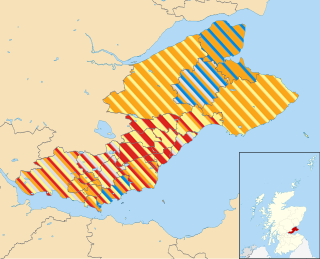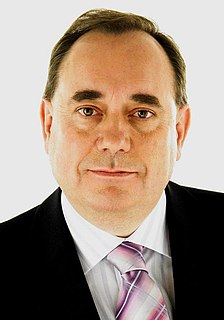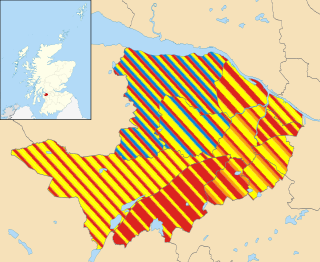The Politics of Aberdeen, Scotland have changed significantly in recent years. In 1996, under the Local Government etc. (Scotland) Act 1994, Grampian Regional Council and Aberdeen District Council were dissolved, creating the new unitary Aberdeen City Council to represent the city's council area.

Elections to Glasgow City Council were held on 3 May 2007, the same day as the other Scottish local government elections and the Scottish Parliament general election. The election was the first one using 21 new wards created as a results of the Local Governance (Scotland) Act 2004, each ward elected three or four councillors using the single transferable vote system a form of proportional representation. The new wards replaced 79 single-member wards which used the plurality system of election. It also saw the election of Glasgow's first councillors for the Scottish Green Party and for Solidarity.

The 2007 Aberdeen City Council election took place on 3 May 2007 to elect members of Aberdeen City Council, at the same time as the Scottish Parliament general election. The election was the first one using 13 new wards created as a result of the Local Governance (Scotland) Act 2004, with each ward electing three or four councillors using the single transferable vote system a form of proportional representation. The new wards replaced 43 single-member wards, which used the plurality system of election.

Elections to Dundee City Council were held on 3 May 2007, the same day as the other Scottish local government elections and the Scottish Parliament general election.
Elections to West Dunbartonshire Council were held on 3 May 2007, the same day as the other Scottish local government elections and the Scottish Parliament general election. The election was the first one using six new wards created as a results of the Local Governance (Scotland) Act 2004, each ward will elect three or four councillors using the single transferable vote system a form of proportional representation. The new wards replace 22 single-member wards which used the plurality system of election.

Elections to Aberdeenshire Council were held on 3 May 2007 the same day as the other Scottish local government elections and the Scottish Parliament general election. The election was the first one using 19 new wards created as a results of the Local Governance (Scotland) Act 2004, each ward will elect three or four councillors using the single transferable vote system a form of proportional representation. The new wards replace 68 single-member wards which used the plurality system of election.
Elections to East Dunbartonshire Council were held on 3 May 2007, the same day as the other Scottish local government elections and the Scottish Parliament general election. The election was the first one using 8 new wards created as a results of the Local Governance (Scotland) Act 2004 each ward will elect three councillors using the single transferable vote system a form of proportional representation. The new wards replace 24 single-member wards which used the plurality system of election.

Elections to Fife Council were held on 3 May 2007, the same day as the other Scottish local government elections and the Scottish Parliament general election. The election was the first one using 23 new wards created as a results of the Local Governance (Scotland) Act 2004, each ward will elect three or four councillors using the single transferable vote system a form of proportional representation. The new wards replace 78 single-member wards which used the plurality system of election.
Elections to the Highland Council were held on 3 May 2007; the same day as elections to the Scottish Parliament and to the 31 other councils in Scotland. Previous elections to the Council had been conducted using the single member plurality system. Changes implemented by the Local Governance (Scotland) Act 2004 meant that future local government elections were to be conducted using the Single Transferable Vote, beginning with those in 2007. The 80 Highland Councillors were now to be elected from 22 wards, returning either three or four members.
Elections to Argyll and Bute Council were held on 3 May 2007 the same day as the other Scottish local government elections and the Scottish Parliament general election. The election was the first one using 11 new wards created as a results of the Local Governance (Scotland) Act 2004, each ward will elect three or four councillors using the single transferable vote system a form of proportional representation. The new wards replace 36 single-member wards which used the plurality system of election.

Elections to South Lanarkshire Council were held on 3 May 2007 the same day as the other Scottish local government elections and the Scottish Parliament general election. The election was the first one using 20 new wards created as a results of the Local Governance (Scotland) Act 2004, each ward will elect three or four councillors using the single transferable vote system a form of proportional representation. The new wards replace 67 single-member wards which used the plurality system of election.

Elections to Midlothian Council were held on 3 May 2007, the same day as the other Scottish local government elections and the Scottish Parliament general election. The election was the first one using six new wards created as a result of the Local Governance (Scotland) Act 2004. Each ward will elect three or four councillors using the single transferable vote system a form of proportional representation. The new wards replace 18 single-member wards which used the plurality system of election.
Elections to East Ayrshire Council were held on 3 May 2007, the same day as the other Scottish local government elections and the Scottish Parliament general election. The election was the first one using nine new wards created as a results of the Local Governance (Scotland) Act 2004, each ward will elect three or four councillors using the single transferable vote system a form of proportional representation. The new wards replace 32 single-member wards which used the plurality system of election.
Elections to Inverclyde Council were held on 3 May 2007 the same day as the Scottish Parliament general election. The election was the first one using six new wards created as a result of the Local Governance (Scotland) Act 2004; each ward will elect three or four councillors using the single transferable vote system, a form of proportional representation. The new wards replace 20 single-member wards which used the plurality system of election.

The 2012 Scottish local elections, were held on 3 May, in all 32 local authorities. The Scottish National Party (SNP) overtook Labour to win the highest share of the vote, and retained and strengthened its position as the party with most councillors. Labour also made gains, while the Liberal Democrats experienced meltdown, falling behind the Conservatives. For the first time since the introduction of the Single Transferable Vote system, the SNP won majority control of 2 councils, from no overall control. Labour also won majority control of 2 councils from no overall control, while retaining majority control over 2 councils.

Elections to Renfrewshire Council were held on 3 May 2007, the same day as the other Scottish local government elections and the Scottish Parliament general election. The election was the first one using 11 new wards created as a results of the Local Governance (Scotland) Act 2004, each ward will elect three or four councillors using the single transferable vote system a form of proportional representation. The new wards replace 40 single-member wards which used the plurality system of election.

Elections to South Ayrshire Council were held on 3 May 2007, the same day as the other Scottish local government elections and the Scottish Parliament general election. The election was the first one using eight new wards created as a results of the Local Governance (Scotland) Act 2004, each ward will elect three or four councillors using the single transferable vote system a form of proportional representation. The new wards replace 30 single-member wards which used the plurality system of election.
Elections to Clackmannanshire Council were held on 3 May 2012, the same day as the 31 other local authorities in Scotland. The election used the five wards created under the Local Governance (Scotland) Act 2004, with 18 Councillors being elected. Each ward elected either 3 or 4 members, using the STV electoral system.
The 2012 Orkney Council election took place on 3 May 2012 to elect members of Orkney Council. The election used the six wards created as a result of the Local Governance (Scotland) Act 2004, with each ward electing three or four Councillors using the single transferable vote system a form of proportional representation, with 21 Councillors being elected.

The Clackmannanshire Council election of 2017 was held on 4 May 2017, on the same day as the 31 other local authorities in Scotland. It was the third successive election to run under the STV electoral system and used the five wards created under the Local Governance (Scotland) Act 2004, with 18 councillors being elected.











